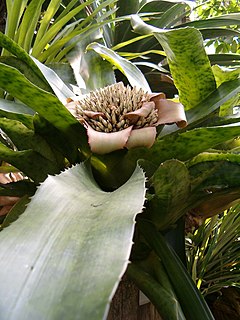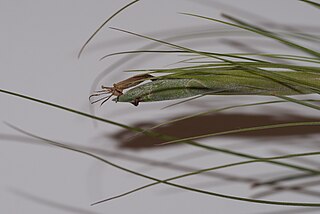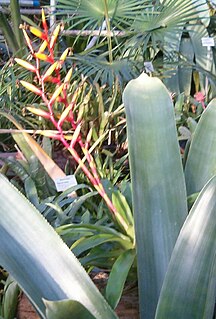
Cryptanthus is a genus of flowering plants in the family Bromeliaceae, subfamily Bromelioideae. The genus name is from the Greek cryptos (hidden) and anthos (flower). This genus has two recognized subgenera: the type subgenus and HoplocryptanthusMez. All species of this genus are endemic to Brazil. The common name for any Cryptanthus is "Earth star".

Vriesea fosteriana is a plant species in the genus Vriesea. This species is endemic to Brazil.
Aechmea alba is a species of plant in the genus Aechmea. This species is endemic to Brazil.

Aechmea purpureorosea is a plant species in the genus Aechmea. This species is endemic to southeastern Brazil, States of Minas Gerais and Rio de Janeiro.

Edmundoa lindenii is a plant species in the genus Edmundoa. This species is endemic to Brazil.

Edmundoa perplexa is a plant species in the genus Edmundoa. This species is endemic to Brazil.

Neoregelia carolinae or Blushing Bromeliad is a species in the genus Neoregelia. It is noted for its centre turning red when it's about to flower, from where the common name (Blushing) is derived. This species is endemic to Brazil.

Neoregelia concentrica is a species of bromeliad in the genus Neoregelia. This species is endemic to Brazil.
Billbergia meyeri is a species in the genus Billbergia. This species is native to Bolivia and Brazil.

Bromelia karatas is a plant species in the genus Bromelia. This species is native to West Indies and to Latin America from San Luis Potosí + Sinaloa south to Brazil.

Tillandsia gardneri is a species in the genus Tillandsia. This species is native to Trinidad & Tobago, Colombia, eastern Brazil and Venezuela.

Tillandsia geminiflora is a species in the genus Tillandsia. This species is native to Brazil, Suriname, Paraguay, Uruguay, and the Misiones Province of Argentina.

Tillandsia globosa is a species in the genus Tillandsia. This species is native to Brazil and Venezuela.

Tillandsia juncea is a species in the genus Tillandsia. This species is native to northern South America, Central America, Mexico and the West indies.
Tillandsia paraensis is a species in the genus Tillandsia. This species is native to Bolivia, Peru, Ecuador, Colombia, the Guianas, Brazil and Venezuela.

Tillandsia recurvifolia is a species in the genus Tillandsia. This species is native to Bolivia, Paraguay, Uruguay, Argentina, and Brazil.

Tillandsia stricta is a species in the genus Tillandsia. This species is native to South America and Trinidad.

Tillandsia tenuifolia, the narrowleaf airplant, is a species in the genus Tillandsia. This species is widespread across much of South America and the Caribbean islands.

Vriesea platynema is a plant species in the genus Vriesea. This species is native to the West Indies and South America.

Vriesea procera is a plant species in the genus Vriesea. This species is an epiphyte native to Trinidad and South America.
















